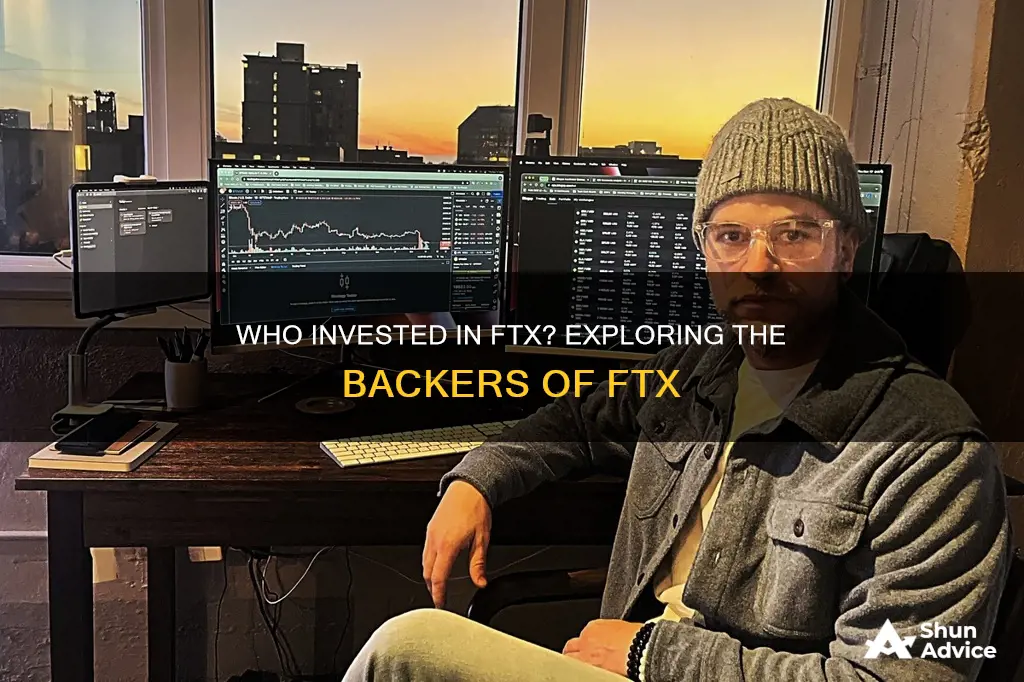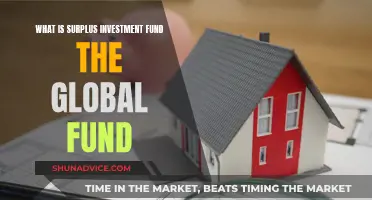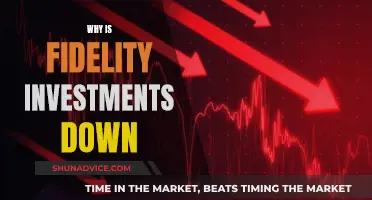
FTX, formerly one of the world's largest crypto exchanges, was founded in 2019 by Sam Bankman-Fried and Gary Wang. In January 2022, it was valued at $32 billion during a fundraising exercise. The company's rapid expansion drew in venture capitalists eager to get in on the Bitcoin boom. FTX's investors included SoftBank, Sequoia Capital, Singapore-government-owned investment firm Temasek, Tiger Global Management, and the Ontario Teachers' Pension Plan. In total, investors poured nearly $2 billion into FTX in just two years. However, the company filed for Chapter 11 bankruptcy protection in November 2022, putting the investments of these firms at risk.
| Characteristics | Values |
|---|---|
| Company Type | Cryptocurrency derivatives exchange |
| Valuation | $32 billion in January 2022 |
| Headquarters | Nassau, Bahamas |
| Founders | Sam Bankman-Fried, Gary Wang |
| Year Founded | 2019 |
| Investors | SoftBank, Sequoia Capital, Temasek, Ontario Teachers' Pension Plan, Paradigm, Tiger Global Management |
| Investor Losses | Over $1 billion |
What You'll Learn
- FTX investors included SoftBank, Sequoia Capital, and Singapore's Temasek Holdings
- Crypto exchange Binance's CEO Changpeng Zhao sold its holdings of FTX's native token
- FTX's collapse was likened to the bankruptcy of Lehman Brothers
- FTX's founder, Sam Bankman-Fried, lost his billionaire status, with his net worth falling below $1 billion
- FTX's investors lost approximately $1.8 billion

FTX investors included SoftBank, Sequoia Capital, and Singapore's Temasek Holdings
FTX, the now-bankrupt cryptocurrency exchange, had a number of high-profile investors. These included SoftBank, Sequoia Capital, and Singapore's Temasek Holdings.
SoftBank, the Japanese multinational conglomerate, invested less than $100 million in FTX, according to a source close to the company. SoftBank has since written down its FTX investments to zero. Sequoia Capital, an American venture capital firm, invested a total of $213.5 million in FTX.com and FTX US, which accounted for less than 3% of the committed capital of one of its funds. Like SoftBank, Sequoia has also written down its FTX investments to zero.
Singapore's state investor, Temasek Holdings, invested a total of $275 million for a minority stake of about 1% in FTX International and about 1.5% in FTX US. Temasek has stated that it will write down the value of its full investment in FTX, irrespective of the outcome of its bankruptcy filing. The company said that it had conducted eight months of due diligence in 2021 and that FTX's financial statements showed it to be profitable. However, Temasek did not have a seat on the FTX board.
In addition to these investors, FTX also had a number of celebrity endorsers and investors, including NFL legend Tom Brady and fashion model Gisele Bundchen.
Best Funds to Invest in NPS: Where to Start?
You may want to see also

Crypto exchange Binance's CEO Changpeng Zhao sold its holdings of FTX's native token
Crypto exchange Binance's CEO Changpeng Zhao, also known as CZ, sold its holdings of FTX's native token, FTT, in November 2022. This decision came after reports that FTX's partner firm, Alameda Research, held a significant portion of its assets in FTT. The announcement of the pending sale by Zhao, along with disputes between Zhao and FTX CEO Sam Bankman-Fried on Twitter, led to a decline in the price of FTT and other cryptocurrencies. This resulted in a three-day depositor sell-off of an estimated $6 billion, sending FTX into a liquidity crisis.
Zhao's decision to sell Binance's holdings of FTT was motivated by "recent revelations that came to light." Specifically, CoinDesk had reported that Alameda Research, a trading firm closely associated with FTX, held a substantial amount of its assets in FTT. This raised concerns about the stability and diversification of FTX's assets, prompting Binance to take action.
Binance's announcement to sell its FTT holdings had a significant impact on the market. The price of FTT dropped by 80% on the day of the announcement, erasing $2 billion in value. This contributed to a wider decline in cryptocurrency prices, with Bitcoin sinking to its lowest price in two years. The sell-off of FTT by Binance also likely influenced the spike in customer withdrawals from FTX, as users sought to protect their funds.
It is important to note that Zhao's decision to sell the FTT holdings was not the only factor in FTX's collapse. Massive fraud perpetrated by Bankman-Fried and his partner, Caroline Ellison, had already forced the company to file for Chapter 11 bankruptcy earlier in 2022. However, Binance's actions and the subsequent market reaction certainly accelerated the crisis and highlighted the fragile nature of the cryptocurrency industry.
In the aftermath of the FTT sale, Zhao denied that he had "master planned" the collapse of FTX. In a memo to employees, he stated that FTX's downfall "is not good for anyone in the industry" and that it should not be seen as a victory for Binance. Despite this, the events surrounding the sale of FTT tokens by Binance contributed to a loss of confidence in the cryptocurrency market and led to increased scrutiny of the industry.
Index Funds in India: Smart Investment or Risky Business?
You may want to see also

FTX's collapse was likened to the bankruptcy of Lehman Brothers
The sudden collapse of FTX, a company that was once valued at $32 billion, drew comparisons to the Lehman Brothers bankruptcy due to the significant financial fallout and the impact on investors and the wider market. FTX's failure also highlighted the lack of regulatory oversight in the cryptocurrency industry, with some calling for increased scrutiny and regulation.
FTX's collapse had a ripple effect on other companies in the cryptocurrency space, with several firms facing losses or exposure to FTX. These included Binance, Genesis, Galaxy Digital, Coinshares, Coinbase, and BlockFi, which was headed toward bankruptcy due to its exposure to FTX. The fallout also extended beyond the crypto industry, impacting companies like Silvergate Bank, which had FTX as a depositor.
The failure of FTX and the subsequent loss of investor funds also brought into question the level of scrutiny applied to the company by its investors. FTX's investors included venture capital firms and investment funds such as SoftBank, Sequoia Capital, Temasek, and the Ontario Teachers' Pension Plan. These investors poured nearly $2 billion into FTX, attracted by its rapid growth and the pitch of its founder. However, the collapse of FTX and the subsequent loss of their investments highlighted the risks of investing in companies with limited oversight and the potential fallout for investors when things go wrong.
In conclusion, the collapse of FTX and its impact on the cryptocurrency market and investors drew comparisons to the bankruptcy of Lehman Brothers. The failure of both companies caused a crisis in their respective sectors and highlighted the potential fallout of a lack of regulatory oversight. The collapse of FTX led to losses for investors and raised questions about the level of scrutiny applied to the company, with calls for increased regulation in the cryptocurrency space.
Ray Dalio's Investment Philosophy: Strategies for Success
You may want to see also

FTX's founder, Sam Bankman-Fried, lost his billionaire status, with his net worth falling below $1 billion
The fall in Bankman-Fried's net worth was due to the collapse of FTX, the cryptocurrency exchange he founded in 2019. FTX's collapse was triggered by massive fraud perpetrated by Bankman-Fried and his partner, Caroline Ellison, which forced the company to file for bankruptcy.
FTX's failure also impacted its investors, who lost significant amounts of money. Venture capital firms and investment funds had showered Bankman-Fried with money, with over 80 investors pouring nearly $2 billion into FTX in just two years. These investors included SoftBank, Sequoia Capital, Temasek, Tiger Global Management, and the Ontario Teachers' Pension Plan. Many of these investors wrote down their FTX investments to zero, resulting in substantial losses.
In addition to financial losses, the fallout from FTX's collapse also led to scrutiny and legal consequences for Bankman-Fried and other key individuals involved. Bankman-Fried was arrested by Bahamian authorities in December 2022, at the request of the US government, and faces charges of fraud, conspiracy to commit money laundering, and conspiracy to defraud the US and violate campaign finance laws. Ellison, as well as other FTX executives, have pleaded guilty and are cooperating with prosecutors.
A Guide to Investing in ICICI Prudential Funds
You may want to see also

FTX's investors lost approximately $1.8 billion
The fallout from FTX's bankruptcy has been significant, with investors facing substantial losses. FTX's investors include prominent venture capital firms and institutional investors such as SoftBank Group, Sequoia Capital, Temasek, Tiger Global Management, and the Ontario Teachers' Pension Plan. These investors were attracted to FTX by Bankman-Fried's pitch, which emphasised his control over the company and his plans to run it with little oversight.
Sequoia Capital, for example, invested a total of $210 million in FTX and FTX US, accounting for less than 3% of the committed capital of one of its funds. Despite this relatively small proportion, the loss of the entire investment still amounts to a significant sum. Similarly, Temasek Holdings, Singapore's state investor, invested a total of $275 million for minority stakes in FTX International and FTX US, which is now likely worthless.
The Ontario Teachers' Pension Plan, which manages the retirement funds of 333,000 teachers in Canada, invested a total of $95 million in FTX and FTX US. While the financial loss from this exposure is expected to have a limited impact on the pension plan, it still represents a significant loss for the investors involved.
In addition to institutional investors, several public figures also invested in FTX and are facing losses. These include NFL legend Tom Brady and fashion model Gisele Bundchen, who owned approximately 0.14% and 0.08% of FTX, respectively. While the exact amount they invested is unclear, their stakes were estimated to be worth $45 million and $25 million, respectively, before the collapse.
The total loss to investors from FTX's bankruptcy is estimated to be around $1.8 billion, with some investors marking down their investments to zero. This has had a significant impact on the investors involved, and has led to increased scrutiny of the lack of oversight exercised over Bankman-Fried and FTX.
Lump-Sum Mutual Fund Investment Guide for Indians
You may want to see also
Frequently asked questions
FTX, formerly one of the world's largest crypto exchanges, was founded in 2019 and expanded rapidly. It was valued at $32 billion in January 2022 during a fundraising exercise. FTX's investors included SoftBank, Sequoia Capital, Singapore's state investor Temasek Holdings, Paradigm, and the Ontario Teachers' Pension Plan.
The total investment of SoftBank Group Corp's Vision Fund in the U.S. and international operations of FTX is less than $100 million.
Sequoia Capital invested a total of $213.5 million in FTX.com and FTX US, which accounted for less than 3% of the fund's committed capital.
Temasek Holdings invested a total of $275 million for a minority stake of about 1% in FTX International and about 1.5% in FTX U.S.







